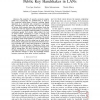3088 search results - page 572 / 618 » Multichannel Security Protocols |
ICC
2009
IEEE
14 years 4 months ago
2009
IEEE
—The ability of setting up a covert channel, which allows any two nodes with Internet connections to engage in secretive communication, clearly causes a very serious security con...
ICNS
2009
IEEE
14 years 4 months ago
2009
IEEE
—The majority of security protocols employ public key cryptography for authentication at least in the connection setup phase. However, verifying digital signatures is an expensiv...
LAWEB
2009
IEEE
14 years 4 months ago
2009
IEEE
Abstract—The World Wide Web offers easy sharing of information, but provides only few options for the protection of sensitive information and other sensitive resources. Tradition...
TPHOL
2009
IEEE
14 years 4 months ago
2009
IEEE
Abstract. We consider a formalisation of a notion of observer (or intruder) theories, commonly used in symbolic analysis of security protocols. An observer theory describes the kno...
ASIACRYPT
2009
Springer
14 years 4 months ago
2009
Springer
Adaptive oblivious transfer (adaptive OT) schemes have wide applications such as oblivious database searches, secure multiparty computation and etc. It is a two-party protocol whic...

